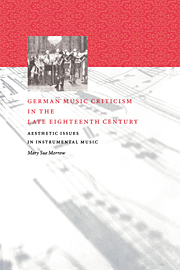Book contents
- Frontmatter
- Contents
- Acknowledgments
- Author's note
- Introduction: terms of discourse
- 1 What does instrumental music mean?
- 2 Answering with a unified voice
- 3 Answering with a German voice
- 4 Answering with aesthetic criteria
- 5 The importance of being correct
- 6 The reign of genius
- 7 A call to order
- 8 Epilogue: segue to the nineteenth century
- Notes
- Bibliography
- Index
6 - The reign of genius
Published online by Cambridge University Press: 03 October 2009
- Frontmatter
- Contents
- Acknowledgments
- Author's note
- Introduction: terms of discourse
- 1 What does instrumental music mean?
- 2 Answering with a unified voice
- 3 Answering with a German voice
- 4 Answering with aesthetic criteria
- 5 The importance of being correct
- 6 The reign of genius
- 7 A call to order
- 8 Epilogue: segue to the nineteenth century
- Notes
- Bibliography
- Index
Summary
Neue Zeitungen von gelehrten Sachen (1773): Johann Friedrich Doles's Sechs Sonaten
To his credit … [the sonatas] do not betray a slavishly imitative spirit, but one that thinks for itself, one that is inventive, lively and pleasant … The things that a strict harmonist might find to criticize here are minor careless mistakes that can be forgiven in a dilettante or excused by fashion. It is always wrong to make too much ado about such trifling matters that can be easily avoided with a little attention. A work of the soul isn't beautiful simply because certain artistic judges find nothing to criticize, especially when those judges only pay attention to the mechanical compliance with the rules and close their eyes to the true signs of a passionate and richly inventive genius.
Gothaische gelehrte Zeitungen (1774): Wolf's Sei Sonate
The keyboard works of a Bach or a Benda have always been the very best a dilettante could own, but now he can confidently add the sonatas of Herr Wolf to them: the same passionate invention! The same novelty, the same audacity of ideas and turns of phrase! Soft and cantabile spots placed between ones that roll and spring; unexpected surprising modulations! And all of that combined with absolutely correct Harmonie in the true, idiomatic style.
It would be hard to find more succinct statements of the change in perspective ushered in by the impetuous and stormy 1770s and 1780s, when the review collective began to abandon the secure precepts of rationalism and follow the siren call of genius.
- Type
- Chapter
- Information
- German Music Criticism in the Late Eighteenth CenturyAesthetic Issues in Instrumental Music, pp. 99 - 133Publisher: Cambridge University PressPrint publication year: 1997

